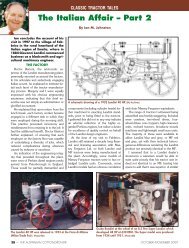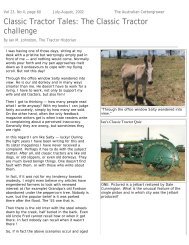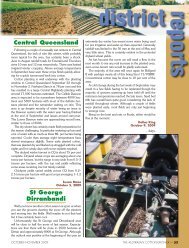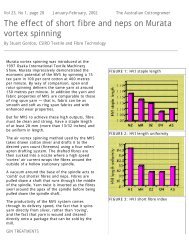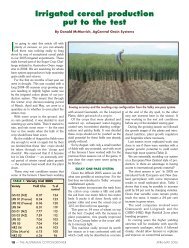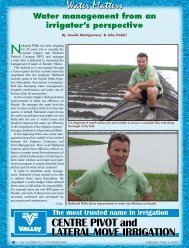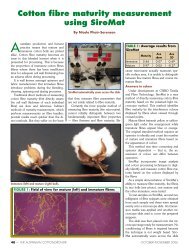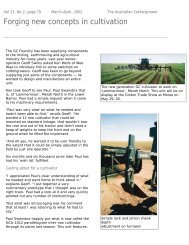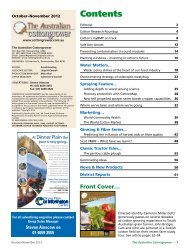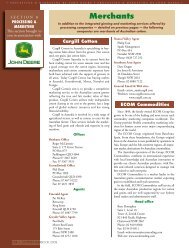growers@sgcotton.com.au Roger Tomkins - Greenmount Press
growers@sgcotton.com.au Roger Tomkins - Greenmount Press
growers@sgcotton.com.au Roger Tomkins - Greenmount Press
You also want an ePaper? Increase the reach of your titles
YUMPU automatically turns print PDFs into web optimized ePapers that Google loves.
to Indian cotton’s export <strong>com</strong>petitiveness during the campaign<br />
ahead.<br />
The sharp retreat of cotton prices during May, and the recent<br />
strong performance of other soft <strong>com</strong>modities such as corn and<br />
soybeans, are already casting considerable doubt on planting<br />
intentions in parts of the Southern Hemisphere. The most<br />
pronounced reaction has thus far been noted in Brazil, where<br />
soybean prices are likely to provide a <strong>com</strong>pelling argument for<br />
a shift away from cotton, when planting takes place around the<br />
year-end. Our current forecast of 1,400,00 tonnes would mark<br />
a reduction of about half a million tonnes, or more than 25 per<br />
cent, in <strong>com</strong>parison to the crop currently being picked.<br />
Some signs of a moderate improvement in consumption<br />
have also emerged of late, notably in markets such as India and<br />
Pakistan, whose spinners have benefited from China’s current<br />
appetite for imported cotton yarn. But on a global scale, neither<br />
the shift away from production, nor the revival of mill use, has<br />
thus far been sufficient to bring world supply and demand<br />
back into balance.<br />
China cotton<br />
training goes<br />
interactive<br />
THE 2012 China International Cotton Trade Training Course<br />
in Qingdao has successfully concluded, with 110 delegates<br />
from 13 different provinces and regions taking part.<br />
The training was developed specifically for the Chinese<br />
cotton <strong>com</strong>munity and focused on areas currently impacting<br />
on China’s international cotton trade and the global cotton<br />
market. The three day interactive course was jointly organised<br />
by the International Cotton Association (ICA) and Beijing Cotton<br />
Outlook Consulting (BCO).<br />
The presentations <strong>com</strong>prising the following modules – each<br />
conducted in Chinese and delivered by a leading industry expert:<br />
■ Fundamental knowledge: World cotton market and import/<br />
export; major cotton export countries and their characteristics.<br />
■ Trading issues: Risk management; contract making, banking<br />
and insurance, futures and options; shipping and logistics;<br />
cotton controlling and testing.<br />
■ Trading rules and dispute resolution: International trading<br />
rules, arbitration agreement; arbitration procedure; arbitrators<br />
training.<br />
For more information, please contact Robert Jiang robert@ica-ltd.org<br />
The Qindao class of 2012.<br />
marketing<br />
ICA arbitrations<br />
remain high<br />
AT the half year stage, the International Cotton Association<br />
(ICA) has received 135 requests for arbitration and, as we<br />
move into quarter three, the pace does not seem to be<br />
slowing down.<br />
With continued market volatility, the industry is seeing more<br />
and more parties failing to honour their contractual obligations.<br />
This is having a direct impact on the number of disputes brought<br />
for arbitration at the ICA.<br />
By its own admittance, the ICA arbitration system has<br />
struggled to cope with the number of arbitrations this past year.<br />
In 2011, the Association received a staggering 242 requests for<br />
technical arbitration – over five times its normal yearly average.<br />
As the pace continues, the ICA has been working hard to<br />
implement a series of improvements to reduce the cost and the<br />
time taken for arbitrations. It also plans to increase the quality<br />
and effectiveness of its awards procedure by introducing a pool<br />
of professional ‘ICA Chairmen’, who will monitor the costs and<br />
time of arbitrations and also the quality of arbitrators in order to<br />
produce more enforceable awards.<br />
“The continued market uncertainty is creating a lot of<br />
challenges for us, but the situation has given rise to a number<br />
of new initiatives,” said Antonio Esteve, ICA President.<br />
“Enforcement of awards is still a big problem in some countries.<br />
The challenge here is to strengthen the effect of our def<strong>au</strong>lt<br />
list. We aim to do this by making better use of “ICA Advisory<br />
Notices”. The notices inform our members about firms that have<br />
a direct link to <strong>com</strong>panies on the def<strong>au</strong>lt list either through legal,<br />
family or individual connections. We are now actively gathering<br />
intelligence to uncover these links and to find out who is trading<br />
with whom and where they are buying and selling their cotton.”<br />
Antonio believes that a <strong>com</strong>mon <strong>com</strong>plaint about the ICA is<br />
that its def<strong>au</strong>lt list is ineffective. Part of the reason is bec<strong>au</strong>se<br />
def<strong>au</strong>lting firms are able to set up and trade through “phoenix<br />
<strong>com</strong>panies” or use trading houses. The ICA’s new approach aims<br />
to highlight the firms involved in these practices and reveal the<br />
trading links with def<strong>au</strong>lters.<br />
“The situation we find ourselves in now highlights the<br />
importance of taking consistent and positive action towards<br />
promoting contract sanctity and a safer trading environment”,<br />
said Antonio. “If the cotton<br />
<strong>com</strong>munity sticks together<br />
to reinforce our efforts then<br />
we may be able to reduce<br />
the stress being placed on<br />
the cotton supply chain<br />
and improve its economic<br />
sustainability.”<br />
Antonio Esteve.<br />
38 — The Australian Cottongrower August–September 2012



